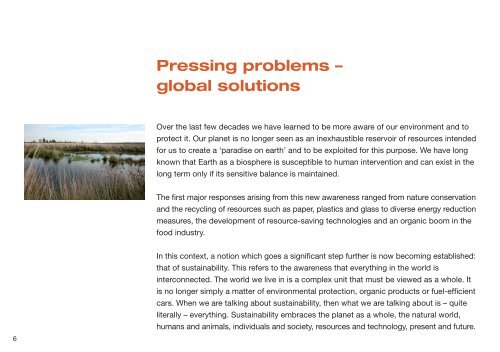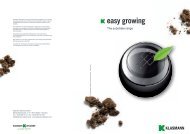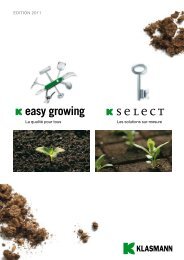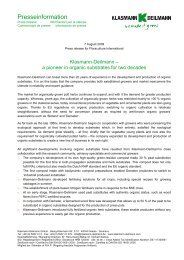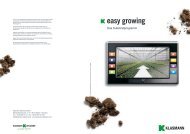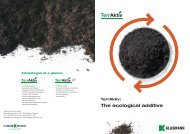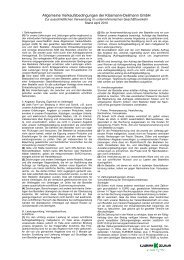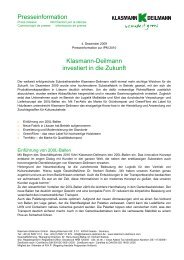Brochure on sustainability - Klasmann Deilmann
Brochure on sustainability - Klasmann Deilmann
Brochure on sustainability - Klasmann Deilmann
You also want an ePaper? Increase the reach of your titles
YUMPU automatically turns print PDFs into web optimized ePapers that Google loves.
Pressing problems –<br />
global soluti<strong>on</strong>s<br />
Over the last few decades we have learned to be more aware of our envir<strong>on</strong>ment and to<br />
protect it. Our planet is no l<strong>on</strong>ger seen as an inexhaustible reservoir of resources intended<br />
for us to create a ‘paradise <strong>on</strong> earth’ and to be exploited for this purpose. We have l<strong>on</strong>g<br />
known that Earth as a biosphere is susceptible to human interventi<strong>on</strong> and can exist in the<br />
l<strong>on</strong>g term <strong>on</strong>ly if its sensitive balance is maintained.<br />
The first major resp<strong>on</strong>ses arising from this new awareness ranged from nature c<strong>on</strong>servati<strong>on</strong><br />
and the recycling of resources such as paper, plastics and glass to diverse energy reducti<strong>on</strong><br />
measures, the development of resource-saving technologies and an organic boom in the<br />
food industry.<br />
In this c<strong>on</strong>text, a noti<strong>on</strong> which goes a significant step further is now becoming established:<br />
that of <strong>sustainability</strong>. This refers to the awareness that everything in the world is<br />
inter c<strong>on</strong>nected. The world we live in is a complex unit that must be viewed as a whole. It<br />
is no l<strong>on</strong>ger simply a matter of envir<strong>on</strong>mental protecti<strong>on</strong>, organic products or fuel-efficient<br />
cars. When we are talking about <strong>sustainability</strong>, then what we are talking about is – quite<br />
literally – everything. Sustainability embraces the planet as a whole, the natural world,<br />
humans and animals, individuals and society, resources and technology, present and future.<br />
It has l<strong>on</strong>g been recognised that the world’s most pressing problems are global in nature<br />
and thus cannot be solved <strong>on</strong>ly at local level, with global warming being <strong>on</strong>e example.<br />
However, previous efforts have not turned the situati<strong>on</strong> around and isolated technical<br />
soluti<strong>on</strong>s – such as the development of ultra-fuel-efficient cars – are, in and of themselves,<br />
completely insufficient. What is needed instead is a radical and worldwide transformati<strong>on</strong><br />
of both producti<strong>on</strong> and c<strong>on</strong>sumpti<strong>on</strong>, with business and society working hand in hand.<br />
The principle of <strong>sustainability</strong> originated from forestry and goes back more than 200 years<br />
to the German forestry scientist Georg Ludwig Hartig. He wrote that the amount of wood<br />
removed from a forest must never exceed what can grow back – so that the woodland is<br />
never completely cut down but allowed to c<strong>on</strong>tinually regenerate.<br />
In 1983, the United Nati<strong>on</strong>s set up the ‘World Commissi<strong>on</strong> <strong>on</strong> Envir<strong>on</strong>ment and<br />
Devel op ment’, which in 1987 published what was called the Brundtland report. This<br />
c<strong>on</strong>tains a statement which has since become key to the definiti<strong>on</strong> of <strong>sustainability</strong>:<br />
“Sustainable development is development that meets the needs of the present without<br />
compromising the ability of future generati<strong>on</strong>s to meet their own needs.”<br />
(Source: www.nachhaltigkeit.info)<br />
6 7


